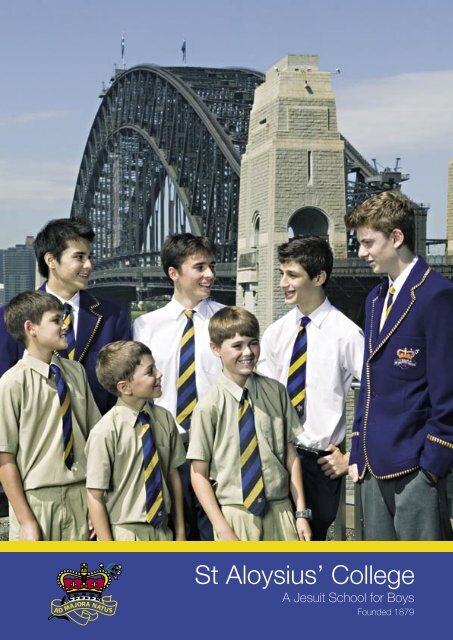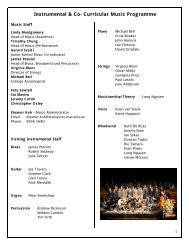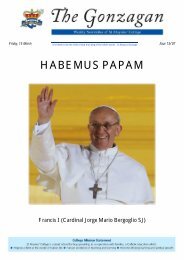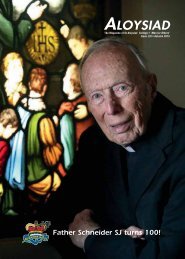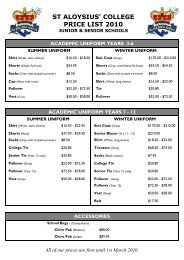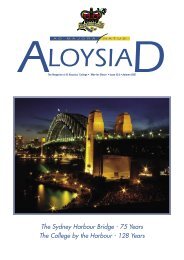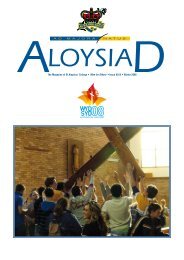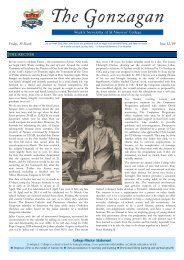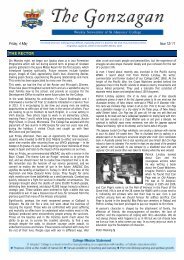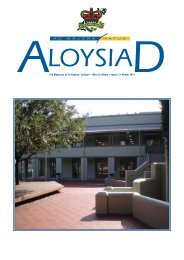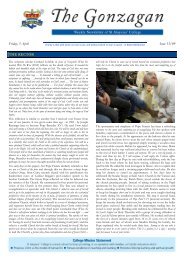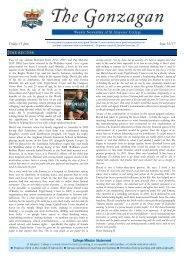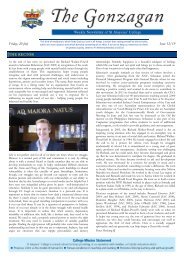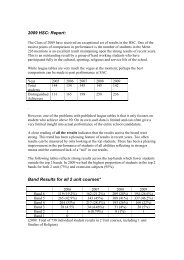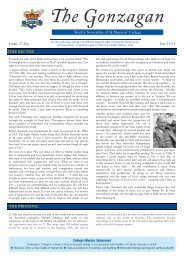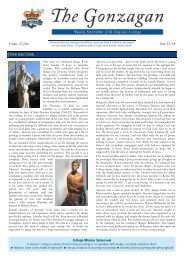College Prospectus - St Aloysius
College Prospectus - St Aloysius
College Prospectus - St Aloysius
You also want an ePaper? Increase the reach of your titles
YUMPU automatically turns print PDFs into web optimized ePapers that Google loves.
<strong>St</strong> <strong>Aloysius</strong>’ <strong>College</strong><br />
A Jesuit School for Boys<br />
Founded 1879
<strong>St</strong> <strong>Aloysius</strong>’ <strong>College</strong><br />
A Jesuit School for Boys<br />
Founded 1879
CONTENTS<br />
<strong>College</strong> Values<br />
The <strong>College</strong> Mission <strong>St</strong>atement<br />
The <strong>College</strong> Crest<br />
The <strong>College</strong> Motto page 3<br />
About <strong>St</strong> <strong>Aloysius</strong>’ <strong>College</strong><br />
Characteristics of Ignatian and Jesuit Tradition page 5<br />
Our Characteristics<br />
Jesuit Education<br />
Spiritual Life<br />
The Focus of Ignatian Spirituality page 7<br />
Our Values<br />
Chaplaincy Services<br />
Retreats, Camps & Reflection Days<br />
The End Point page 9<br />
Developing the Whole Person<br />
A Dedicated <strong>St</strong>aff<br />
Career Counselling<br />
Enrichment and Extension Programmes<br />
The Tutor System<br />
School Counsellor<br />
Support Programmes page 11-13<br />
A Family School<br />
Parent Enrichment Programme<br />
The Co-Curricular Committee<br />
The Junior School Co-Curricular Committee<br />
The Parents’ & Friends’ Association (P&F)<br />
<strong>St</strong> <strong>Aloysius</strong>’ <strong>College</strong> Old Boys’ Union page 15<br />
Men and Women for Others<br />
Community Involvement<br />
The Arrupe Family Outreach Programme<br />
Our Graduates page 17<br />
Information Technology page 21<br />
Curriculum page 23<br />
Co-Curricular Activities<br />
Sport page 25<br />
Other Co-Curricular Activities<br />
Camps, Cadets and The Duke of Edinburgh Award<br />
Debating and Public Speaking<br />
Music<br />
Instrumental Tuition Program<br />
Co-Curricular Ensemble Membership and Performance<br />
Music in the Classroom<br />
Drama page 27-31<br />
Enrolment Policy and Procedure<br />
Policy<br />
Procedure page 33<br />
The <strong>College</strong> by the Harbour<br />
Map page 35<br />
1
2<br />
<strong>College</strong> Values
The <strong>College</strong> Mission <strong>St</strong>atement<br />
<strong>St</strong> <strong>Aloysius</strong>’ <strong>College</strong> is a Jesuit school for boys providing<br />
in co-operation with families a catholic education which:<br />
• Proposes Christ as the model of human life<br />
• Pursues excellence in teaching and learning<br />
• Promotes lifelong learning and spiritual growth<br />
The <strong>College</strong> Crest<br />
The crest is a crown with a lily passing through it, which<br />
are emblems of the nobility and holiness of our Patron,<br />
<strong>St</strong> <strong>Aloysius</strong> Gonzaga, who surrendered his birthright as<br />
the Marquis of Castiglione to become a Jesuit and die as<br />
a young man serving the poor of Rome in time of plague.<br />
The <strong>College</strong> Motto<br />
The <strong>College</strong> motto Ad Majora Natus, ‘Born for Greater Things’,<br />
draws us beyond self interest and self-centredness to more noble<br />
aspirations – heaven of course, but in this world generously putting<br />
our skills, talents and capacities in the service of others.<br />
3
4<br />
About <strong>St</strong> <strong>Aloysius</strong>’ <strong>College</strong>
About <strong>St</strong> <strong>Aloysius</strong>’ <strong>College</strong><br />
<strong>St</strong> <strong>Aloysius</strong>’ <strong>College</strong> is a Catholic independent day school,<br />
for boys from Year 3 to Year 12, situated in the shadow of the<br />
Sydney Harbour Bridge. The <strong>College</strong>, which has an enrolment<br />
of almost 1200 students, is conducted by the Society of Jesus<br />
(Jesuit Fathers and Brothers) and is part of a worldwide network<br />
of 1000 Jesuit primary and secondary schools and universities.<br />
The fi rst school was opened by <strong>St</strong> Ignatius Loyola, the founder<br />
of the Order, in 1548, in Messina, Sicily.<br />
The <strong>College</strong> aspires to assist and support parents in the<br />
formation of their sons in the Ignatian tradition of education,<br />
producing ‘men for others’ who are balanced and motivated,<br />
integrating spiritual maturity and academic excellence with a<br />
rounded social and physical development; men of competence,<br />
conscience and compassion. A Jesuit education stresses the<br />
acquisition of skills and techniques in a purposeful and balanced<br />
perspective. While emphasis is placed on the development of<br />
intellectual and mental skills, attention is also given to other<br />
aspects of personal formation, such as character, attitudes,<br />
values and social interaction.<br />
The <strong>College</strong> aims to ensure that the characteristics of Jesuit<br />
education are effectively present in the teaching policies and<br />
practices that determine the life of the <strong>College</strong>. <strong>St</strong> <strong>Aloysius</strong>’<br />
<strong>College</strong> was founded in 1879 at <strong>St</strong> Kilda House, Woolloomooloo<br />
with a total of 45 pupils. In 1883 the <strong>College</strong> moved to<br />
Auburn Villa, Darlinghurst. In 1903, at the request of the<br />
Archbishop of Sydney, the <strong>College</strong> moved to its present site at<br />
Milsons Point. <strong>St</strong> <strong>Aloysius</strong>’ <strong>College</strong> is the oldest independent<br />
Catholic day boys’ school in New South Wales.<br />
in education, promotes effective school community relations<br />
and fosters a positive, enduring school spirit.<br />
<strong>St</strong> <strong>Aloysius</strong>’ <strong>College</strong> is governed by a School Council<br />
appointed by the Provincial of the Society of Jesus. Its charter<br />
is to conduct the <strong>College</strong> as a Jesuit School, being responsible<br />
to the Provincial for the control and management of the affairs<br />
of the <strong>College</strong>. Day to day management is delegated by the<br />
Council to the Rector and the Principal, who report to Council.<br />
The <strong>College</strong> is the oldest of the six schools which make up<br />
the Associated Schools of New South Wales. It is a member<br />
of the Association of Independent Schools of Australia. The<br />
Rector is a member of the Headmasters’ Conference of New<br />
South Wales and of the Association of Heads of Independent<br />
Schools of Australia.<br />
Characteristics of Ignatian<br />
and Jesuit Tradition<br />
As one of the many Jesuit colleges, both in Australia and<br />
abroad, <strong>St</strong> <strong>Aloysius</strong>’ <strong>College</strong> shares a common educational<br />
tradition refi ned by over four hundred and fi fty years<br />
of experience.<br />
Today the <strong>College</strong> is spread over three campuses. The Junior<br />
School is situated in Burton <strong>St</strong>reet, Milsons Point. This campus<br />
was acquired and redeveloped by the <strong>College</strong> in 1992. The<br />
Middle School is located in Upper Pitt <strong>St</strong>reet as is the Wyalla<br />
Senior School. The <strong>College</strong> Oval is located at Willoughby.<br />
Every aspect of Jesuit education contributes to the total<br />
development of each individual person. Ideally each student<br />
is seen as gifted and unique, as a gift from God to his parents,<br />
from his parents to the <strong>College</strong>. He is encouraged to develop<br />
and achieve at a pace suited to his ability and personality.<br />
A Foundation exists to secure strong fi nancial support for the<br />
benefi t of <strong>St</strong> <strong>Aloysius</strong>’ <strong>College</strong>. It also ensures its pre-eminence<br />
The Characteristics of Jesuit Education (1987) spells out its<br />
aims in nine main characteristics.<br />
5
6<br />
Our Characteristics
Jesuit Education<br />
Spiritual Life<br />
• Is world-affi rming, assisting in the total formation of each<br />
individual within the human community. It includes a religious<br />
dimension that permeates the entire education and it is an<br />
apostolic instrument, promoting dialogue between faith<br />
and culture.<br />
• Insists on individual care and concern for each person,<br />
emphasising activity on the part of the student and<br />
encouraging life-long openness to growth.<br />
During his time at the <strong>College</strong>, each boy is offered a diversity of<br />
spiritual experiences. Sacramental and liturgical programmes,<br />
retreats and refl ection days aim at helping each student’s<br />
pursuit of personal spiritual maturity.<br />
The motto of the Jesuits is Ad Maiorem Dei Gloriam (“for the<br />
greater glory of God”). In the second century, <strong>St</strong> Irenaeus<br />
argued that ‘the glory of God is man and woman fully alive’,<br />
personal development is integral to spiritual maturity.<br />
• Is value-oriented, encouraging a realistic knowledge, love and<br />
acceptance of self and providing a realistic knowledge of the<br />
world in which we live.<br />
• Proposes Christ as the model of human life.<br />
The Focus of Ignatian Spirituality<br />
• Develops an abiding personal relationship with<br />
Jesus Christ;<br />
• Provides adequate pastoral care, celebrating faith in personal<br />
and community prayer, worship and service.<br />
• Seeks and fi nds God readily in all things that touch upon<br />
daily life;<br />
• Prepares for active life commitment, serving the faith that<br />
does justice. It seeks to form “men for others”, manifesting a<br />
particular concern for the poor.<br />
• Is expressed in a commitment to helping others, especially<br />
the poor – what the Church calls “a preferential love of<br />
the poor”;<br />
• <strong>St</strong>resses lay-Jesuit collaboration relying on a spirit of<br />
community among teaching staff and administrators, the<br />
Jesuit community, governing boards, parents, Old Boys<br />
and benefactors.<br />
• Takes place within a structure that promotes community.<br />
• Adapts means and methods in order to achieve its purposes<br />
most effectively. It is a ‘system’ of schools with a common<br />
vision and common goals, assisting in providing the<br />
professional training and ongoing formation that is needed,<br />
especially for teachers.<br />
• Means discerning, through prayer, how God is moving<br />
and shaping the student’s inner life;<br />
• Creates God’s Kingdom on this earth in companionship<br />
with others.<br />
The geographical heart of this <strong>College</strong> is the Chapel. A central<br />
stained glass window reveals the spirit of heroic Jesuits over<br />
the centuries. In retreats, the religious education programme,<br />
and communal or individual worship, opportunities are provided<br />
to glimpse the wonder of the God within each student and<br />
the community.<br />
• Is an apostolic instrument, in service of the church as it serves<br />
human society. It prepares students for active participation in<br />
the church and the local community, for the service of others.<br />
• Pursues excellence in its work of formation and witnesses<br />
to excellence.<br />
7
8<br />
Our Values
Chaplaincy Services<br />
A number of Chaplains, both Jesuit and lay, are available for<br />
students. A full-time Youth Minister works in the Senior School.<br />
Reconciliation is offered at Year group Liturgies. <strong>St</strong>udents may<br />
attend Mass daily, either individually or with friends or family, and<br />
Family Masses are held for each Year group. Many Feast Days are<br />
celebrated, and one of the most popular is the Patronal Feast of<br />
<strong>St</strong> <strong>Aloysius</strong> where Mass is followed by celebrations either with the<br />
tutor group or with members of the same year.<br />
Retreats, Camps & Reflection Days<br />
Every boy from Year 5 to Year 11 leaves the school setting<br />
once a year for a time of prayer and refl ection – central to<br />
Ignatian formation. These experiences further the boys’ spiritual<br />
development and facilitate their relationship with God. <strong>St</strong>udents<br />
are encouraged to express feelings and aspirations and to gain an<br />
understanding of living in a community.<br />
Each year has a particular focus. The Year 7 Orientation Camp,<br />
for example, looks at developing relationships, whereas the Year 10<br />
retreat has vocations as its theme. In Year 12, four Kairos retreats<br />
are offered during the year.<br />
The End Point<br />
Such a formation in faith draws the student to an outwardly<br />
focussed orientation where one’s abilities and talents are<br />
not regarded as assets to be selfi shly hoarded, but gifts to<br />
be spent generously in the service of others. Not surprisingly,<br />
then, that the most popular prayer among the boys is the<br />
Prayer for Generosity, attributed to <strong>St</strong> Ignatius:<br />
Dearest Lord,<br />
teach me to be generous.<br />
Teach me to serve you as you deserve –<br />
to give, and not to count the cost,<br />
to fi ght, and not to heed the wounds,<br />
to toil, and not to seek for rest,<br />
to labour and not to ask reward,<br />
except that of knowing<br />
that I do your holy will.<br />
9
10<br />
Developing the Whole Person
Developing the Whole Person<br />
The <strong>College</strong> aims to provide the caring family environment vital<br />
to the formation of well-adapted individuals. Teaching staff,<br />
student services and the co-curricular programme assist in the<br />
religious, intellectual and personal development of each student.<br />
A Dedicated <strong>St</strong>aff<br />
<strong>St</strong>aff at <strong>St</strong> <strong>Aloysius</strong>’ are called to be ‘men and women of<br />
the Spirit’, knowing that, in addition to the high standards<br />
of professionalism in their teaching, their personal example<br />
infl uences student character. To fulfi l their responsibilities and<br />
to maintain balance in their own lives, the <strong>College</strong> aims to<br />
provide them with opportunities for professional and personal<br />
development. There is a particular style of pedagogy in the<br />
Ignatian tradition in which all staff share. They have the major<br />
responsibility for the moral and intellectual formation of the boys<br />
in their care. They involve themselves in co-curricular activities<br />
and develop close and meaningful relationships with students.<br />
In all Jesuit ministries, the concept of ‘lay partnership’ is taken<br />
seriously. Therefore, lay staff are able to take many opportunities<br />
to engage in and then share the rich tradition of Ignatian<br />
spirituality and world-view.<br />
In the Senior School, Year Co-ordinators are responsible for<br />
the day-to-day care of the students in their year. This ranges<br />
from disciplining students to guidance on academic and<br />
personal issues. In the Junior School this role is undertaken<br />
by the Class teachers.<br />
11
12<br />
Developing the Whole Person
Career Counselling<br />
Career counselling is available for all students. Year 10 students<br />
are individually counselled about HSC subject choices. Year 12<br />
students are assisted with their applications for tertiary study<br />
and beyond.<br />
Enrichment & Extension Programmes<br />
School Counsellor<br />
The Junior School has a wide range of activities to cater for the<br />
needs and development of gifted and talented students. These<br />
activities include drama, competitions (English, Maths, Science),<br />
chess, lateral thinking groups, debating, Tournament of Minds<br />
and a number of Gifted and Talented workshops offered by the<br />
University of NSW and the Junior School Heads Association<br />
of Australia (JSHAA). These programmes are conducted<br />
both during and after school hours. A Learning Enrichment<br />
teacher is available to assist students to reach their academic<br />
potential. The teacher co-ordinates extension and enrichment<br />
opportunities for more able students, provides support to the<br />
classroom teachers for strategies to assist individual students<br />
in their learning and provides professional development<br />
opportunities for staff.<br />
The <strong>College</strong> employs a School Counsellor who is available<br />
to students and parents to help work through behavioural<br />
and social issues which may be impacting adversely on the<br />
student’s personal development.<br />
Support Programmes<br />
The <strong>College</strong> offers a number of programmes which focus<br />
on building up the resilience of each student. These include<br />
the Seasons for Growth Programme, Problem Solving for<br />
Life, Adolescents Coping with Emotions (ACE) and the<br />
Friends Programme.<br />
The Tutor System<br />
The Tutor System is designed to provide quality pastoral and<br />
personal care for every student in the Senior School. Every<br />
student (and any brothers) has a particular tutor who is assigned<br />
for the duration of his <strong>College</strong> life. The tutor is an important<br />
contact for the boy and his parents. Each tutor group has on<br />
average thirteen boys who range from Year 7 to Year 12.<br />
13
14<br />
A Family School
Parent Enrichment Programme<br />
This programme provides opportunities for refl ection and<br />
growth and keeps parents informed. The programme deals<br />
with issues concerning students, their surroundings and their<br />
entire family. It includes opportunities for parents to deepen<br />
their understanding of Ignatian spirituality and pedagogy which<br />
shape the particular style of this school.<br />
A Family School<br />
The Co-Curricular Committee<br />
Parents are the primary educators of their children and the<br />
<strong>College</strong> includes them where possible in the all-round<br />
development of their sons. Parents’ specialised knowledge<br />
of their children makes them uniquely able to contribute to the<br />
partnership between the student, family and <strong>College</strong> staff in<br />
the interests of maximising each student’s schooling outcome.<br />
The active participation of parents in the life of the <strong>College</strong><br />
and the progress of their sons is welcomed, encouraged,<br />
even expected.<br />
As a Catholic school in the Jesuit tradition, the <strong>College</strong> provides<br />
a Catholic education to its students, most of whom are Catholic.<br />
The individual belief of each boy and the right of families to<br />
their own values, attitudes and beliefs is respected. Congruence<br />
between the home and the <strong>College</strong> is crucial for the proper<br />
formation of students of <strong>St</strong> <strong>Aloysius</strong>’ <strong>College</strong>.<br />
The Co-Curricular Committee supports and raises funds for the<br />
various co-curricular activities, each of which has parent and<br />
staff representatives working together to benefi t the students.<br />
This is a whole school committee.<br />
The Junior School Co-Curricular<br />
Committee<br />
This committee looks specifi cally at supporting the Junior<br />
School staff in the organisation of sport and other<br />
co-curricular activities.<br />
The Parents’ & Friends’ Association (P&F)<br />
The P&F contributes greatly to the sense of community and<br />
friendliness at the <strong>College</strong> by organising functions aimed at<br />
bringing the Aloysian family closer together. Educational issues<br />
are discussed at regular Forum meetings.<br />
<strong>St</strong> <strong>Aloysius</strong>’ <strong>College</strong> Old Boys’ Union<br />
The <strong>St</strong> <strong>Aloysius</strong>’ <strong>College</strong> Old Boys’ union assists Old Boys<br />
to maintain contact with each other and with the <strong>College</strong>.<br />
Members of the Union support the <strong>College</strong> through various<br />
activities and fund special projects including an annual<br />
Careers Day for Year 12 students.<br />
The Union also fi nancially supports the activities of the<br />
<strong>College</strong> and funds a number of Bursaries each year.<br />
Old Boys of the <strong>College</strong> are encouraged to continue their<br />
involvement after graduation. Many assist with <strong>College</strong><br />
activities on a regular basis.<br />
15
16<br />
Men and Women for Others
‘Men and Women for Others’<br />
Jesuit education tries to develop in students an ability to know<br />
reality and to evaluate it critically. This awareness includes a<br />
realisation that persons and structures can change, together<br />
with a commitment to work for those changes in a way that will<br />
help to build more than just human structures, which will provide<br />
an opportunity for the exercise of freedom joined to greater<br />
human dignity for all. Most importantly, ‘men and women for<br />
others’ means that those in the Ignatian tradition work for and<br />
with the poor.<br />
Community Involvement<br />
The Arrupe Family Outreach Programme<br />
Jesuit schools are called on to reach out into the community,<br />
not only to the extended school community of parents,<br />
Old Boys and friends, but also to the poor and socially<br />
disadvantaged in the neighbourhood and abroad.<br />
In preparation for what the <strong>College</strong> hopes will be a lifetime<br />
commitment to the service of others, an important part of<br />
the <strong>College</strong> programme is community involvement, in which<br />
all students are expected to participate. <strong>St</strong>udent-initiated<br />
fundraising for charity is also a frequent experience.<br />
The comprehensive Year 11 Faith in Service Programme<br />
presents students with a real challenge. Through this<br />
programme students gain an extensive insight into many<br />
aspects of life for the marginalised, the infi rmed and the poor.<br />
Guided refl ection on such experiences allows meaning to<br />
surface so that values and understandings can be shaped.<br />
The <strong>College</strong> <strong>St</strong> Vincent de Paul Society is active offering service<br />
to those in need and raising funds for charity. The group meets<br />
once a week and conducts fund raising for charity.<br />
Year 11 and Year 12 boys can join <strong>St</strong> Vincent de Paul as a full<br />
time co-curricular activity. The group is open for all boys in<br />
Years 7 to 12. A chapter of Amnesty International also is active<br />
in the <strong>College</strong>.<br />
This programme provides opportunities for current and past<br />
parents and young Old Boys to experience working with the<br />
poor and marginalised in some of the Jesuit social ministries<br />
in learning to serve whilst serving to learn.<br />
Our Graduates<br />
It is hoped graduates will be ‘well-rounded, intellectually<br />
competent, open to growth, religious, loving, committed to<br />
doing justice in generous service to the people of God’ - a<br />
man who is competent and compassionate, a man whose<br />
conscience is sensitive to the demands of the Gospel. They<br />
will be ‘men of peace and justice, committed to be agents<br />
of change in the world which recognises how widespread is<br />
injustice, how pervasive the forces of oppression, selfi shness<br />
and consumerism’.<br />
(The Very Rev Fr Peter Han Kolvenbach, SJ Superior General<br />
of the Society of Jesus, 1993.)<br />
34.<br />
17
18<br />
The <strong>College</strong> by the Harbour
20<br />
Information Technology
Information Technology<br />
Under the guidance of the Rector, the <strong>College</strong> is equipping our<br />
men for life in the 21st century. <strong>St</strong>rategies must be constantly<br />
reviewed and updated in order to remain effective in assisting<br />
the <strong>College</strong> to achieve its goals. Both the Junior and Senior<br />
Schools are constantly endeavouring to improve IT based<br />
resources to effectively support the curriculum throughout<br />
all year levels.<br />
The <strong>College</strong> sees a familiarity with computers, and the<br />
programmes that run on them as an essential part of the<br />
Curriculum. Computers have become everyday tools for a<br />
wide variety of tasks in business, home management and<br />
entertainment, communications and education.<br />
<strong>St</strong>udents and staff at both the Junior School and the Senior<br />
School enjoy the following facilities demonstrating an ongoing<br />
commitment to equipping future generations with comprehensive<br />
IT skills.<br />
<strong>St</strong> <strong>Aloysius</strong>’ <strong>College</strong> has integrated computer elements into<br />
all aspects of its curriculum, rather than introducing Computer<br />
<strong>St</strong>udies as an isolated study. <strong>St</strong>udents receive instruction on<br />
using computers as a valuable resource in research, design,<br />
planning and production.<br />
An important component of the IT strategy is ongoing training<br />
of staff to ensure that they have the expertise to fully utilise the<br />
IT facilities available to students. A number of subject areas have<br />
developed innovative programs to enhance learning through the<br />
use of computer technology.<br />
• Up-to-date Pentium technology<br />
• Multi-user access to interactive multimedia software supporting<br />
the curriculum<br />
• Multiple CD-ROMs offering simultaneous user access<br />
• Simultaneous multi-user access to the Internet<br />
• A school-developed Intranet facility<br />
• Four computer laboratories (including one in the Junior School)<br />
• Music computer laboratory<br />
• Two library computer research areas<br />
• Senior research area<br />
Multimedia CD packages (including encyclopaedias) are<br />
valuable teaching resources used increasingly across all subject<br />
areas. Sophisticated supervised Internet connections provide<br />
access to the vast pool of information of the World Wide Web.<br />
These resources are installed and maintained in the Senior and<br />
Junior Libraries, computer labs and other areas throughout<br />
the <strong>College</strong>.<br />
www.staloysius.nsw.edu.au<br />
21
22<br />
Curriculum
Curriculum<br />
<strong>St</strong> <strong>Aloysius</strong>’ <strong>College</strong> is grounded in the Jesuit tradition. It<br />
attempts to live the ideals of Ignatian education, clearly stated<br />
in The Characteristics of Jesuit Education, and lived out through<br />
the dynamic of the Ignatian Pedagogical Paradigm. The <strong>College</strong><br />
also aims to work closely with parents, who are the primary<br />
educators of their sons. The partnership between school and<br />
parents is crucial to the success of the educational endeavour.<br />
In common with other Jesuit schools, the <strong>College</strong> has a<br />
commitment to holistic education. Hence, participation in<br />
cultural, sporting, spiritual and service programmes of the<br />
<strong>College</strong> is also expected of all students. The <strong>College</strong>’s aim<br />
is to develop within the student the qualities of commitment,<br />
conscience, competence and compassion to prepare him<br />
to go into the world to act with a faith that does justice.<br />
In the curriculum, there is an emphasis on pursuing academic<br />
excellence in Humanities, the Sciences and the Creative Arts.<br />
The <strong>College</strong> recognises the vital importance of maintaining<br />
high standards of teaching, and supports and encourages the<br />
ongoing professional development of all teaching staff. <strong>St</strong>aff<br />
selection and appointment processes aim to attract and retain<br />
excellent teachers who can provide students with the best<br />
possible learning opportunities.<br />
In such an environment, it has been found that a student<br />
needs above average scholastic ability to be comfortable<br />
with the style and pace of learning. This allows us to focus<br />
on what we do well and best meet the needs of our students.<br />
Given the nature of the curriculum, composition of classes<br />
and style of learning, it is important that parents, teachers<br />
and administrators realise the nature of education offered and<br />
ensure the boys’ educational needs are being met. Similarly,<br />
it is important that the <strong>College</strong> regularly test and review student<br />
performance to ensure that each student is developing and<br />
progressing to his potential.<br />
The programme of study is designed to promote a lifelong love<br />
of learning whilst developing the whole person. Learning how to<br />
learn, promoting independent learning, developing research and<br />
investigative skills and exploring the signifi cance and relevance<br />
of what is learnt are all priorities in our academic programme.<br />
Education in the Ignatian tradition is refl ective learning. The<br />
normal progression for most students is to University study and<br />
the emphasis of the academic programme refl ects this. Hence<br />
the curriculum does not include subjects from Technical or<br />
Vocational areas.<br />
23
24<br />
Co-Curricular Activities
Co-Curricular Activities<br />
The academic programme at <strong>St</strong> <strong>Aloysius</strong>’ <strong>College</strong> is supported<br />
by a strong co-curricular programme to ensure that every boy<br />
has an holistic education. All students are expected to be fully<br />
committed to the co-curricular life of the <strong>College</strong>. Sport is the<br />
main co-curricular activity and an important element in the<br />
overall curriculum of the <strong>College</strong>. <strong>St</strong>udents are also encouraged<br />
to participate in a wide range of co-curricular activities which<br />
complement the sporting programme. All members of the<br />
<strong>College</strong> Teaching <strong>St</strong>aff are involved in sporting and/or other<br />
co-curricular activities.<br />
Sport<br />
Sport is important to the development and attitudes of our<br />
students. Every student plays an active role in sport, with<br />
emphasis placed on participation rather than winning at all<br />
costs. Boys are encouraged to make an effort in their chosen<br />
activities and receive coaching assistance regardless of<br />
proficiency or potential. The importance of physical fitness<br />
is promoted in a programme, the aim of which is for sport to<br />
become an integral part of the students’ lifestyle.<br />
All students are required to participate in one mid week sport<br />
training session and one afternoon session per week (Junior<br />
School) or two afternoons a week (Senior School) and at the<br />
weekend. Competition is mainly within the Associated Schools<br />
of New South Wales.<br />
A Parent Co-Curricular Committee for each sport assists in<br />
providing resources to train coaches and purchase equipment.<br />
Physical education is part of the curriculum. Most major<br />
sports are offered at the <strong>College</strong>:<br />
Athletics<br />
Basketball<br />
Chess<br />
Cricket<br />
Cross Country<br />
Fencing<br />
Football<br />
Rugby Union<br />
Swimming<br />
Tae Kwon Do<br />
Tennis<br />
Volleyball<br />
Water Polo<br />
Softball (Junior School)<br />
The <strong>College</strong> does not offer any form of sporting scholarship.<br />
Boys with a natural sporting talent are encouraged and<br />
developed but scholarships are not given to artificially boost<br />
the <strong>College</strong>’s sporting success.<br />
The <strong>College</strong> has a gymnasium, weights room and basketball<br />
court at Milsons Point and sporting fields at Willoughby.<br />
Sporting teams also train at various venues on the Lower<br />
North Shore.<br />
25
26<br />
Other Co-Curricular Activities
Non-sporting co-curricular activities include:<br />
Cadets<br />
The Duke of Edinburgh Award<br />
Debating and Public Speaking<br />
Music<br />
Drama<br />
Camps, Cadets &<br />
The Duke of Edinburgh Award<br />
Debating and Public Speaking<br />
The <strong>College</strong> believes that learning does not only happen in the<br />
classroom. Outdoor education helps students to learn about<br />
the environment as they build friendships, team spirit and<br />
leadership qualities. They discover much about themselves<br />
and others and grow in self-confi dence and self-reliance.<br />
Junior students attend regular camps where the objectives are<br />
realised through participation in activities such as archery, water<br />
sports, bushwalking, camaraderie around the bonfi re and other<br />
adventure and bush experiences.<br />
The <strong>College</strong> Cadet Unit was founded in 1891. Today the Unit<br />
has a strength of 200 students from Year 8 to Year 12. Regular<br />
camps and bivouacs are held. Instruction is given in activities<br />
such as rock climbing, abseiling, orienteering, First Aid and fi eld<br />
craft. The leadership, challenges and comradeship offered by<br />
the Unit help form the boys in the Jesuit ideal of being ‘men<br />
for others’.<br />
Debating and Public Speaking at the <strong>College</strong> has a long<br />
tradition. From their earliest days, Jesuit schools stressed<br />
eloquentia perfecta, (“fl awless eloquence”). Every boy<br />
participates at least at class level to acquire confi dence in<br />
public speaking, and every opportunity is given for those<br />
who wish to pursue their interest further. The <strong>College</strong><br />
participates in many events including inter-school debating<br />
competitions such as the Associated Schools (CAS),<br />
Independent Schools Debating Association (ISDA), Catholic<br />
Schools Debating Association (CSDA), the Lawrence Campbell<br />
Oratory Competition and the Law Society of NSW Mock<br />
Trials Competition.<br />
The Duke of Edinburgh Award Scheme challenges boys over<br />
14 years who gain a sense of satisfaction from diverse activities<br />
including community service, expeditions, exploration, leisure,<br />
hobbies and social interests, recreational and sporting activities,<br />
The scheme is highly regarded and award winners are regarded<br />
as ‘special achievers’.<br />
27
28<br />
Other Co-Curricular Activities
Music<br />
<strong>St</strong> <strong>Aloysius</strong>’ <strong>College</strong> Music Department is a leader in the<br />
fi eld of boys’ music education with an innovative, active and<br />
adventurous program. The Ignatian tradition encourages<br />
the study of the arts as a means of developing the creative<br />
imaginative and aesthetic sense. In addition to the proven<br />
physical, social, and developmental benefi ts derived by boys<br />
from music education, participation also fosters an appreciation<br />
for various cultural traditions encouraging Ignatian attributes<br />
of tolerance and acceptance.<br />
The music program at the <strong>College</strong> is a vast edifi ce, which is built<br />
on the three pillars of:<br />
• Instrumental Tuition Program<br />
• Co-curricular ensemble membership and performance<br />
• The classroom music program<br />
Instrumental Tuition Program<br />
Current educational research into how boys learn has shown<br />
that a thriving music performance program, which is fed by<br />
a pervasive instrumental tuition service in a school, leads<br />
to the retention of boys in the Music Elective and the Senior<br />
School HSC Music classroom program. With this in mind,<br />
the introduction of boys to instrumental and vocal tuition<br />
commences at <strong>St</strong> <strong>Aloysius</strong>’ <strong>College</strong> in Years 3 and 4 with the<br />
mandatory <strong>St</strong>ring Program. The <strong>College</strong> offers private tuition in<br />
virtually every major musical instrument with a professional staff<br />
of more than 40 visiting instrumental tutors. An instrumental hire<br />
scheme has been established in order to assist parents and<br />
boys in fi nding the most appropriate instrument.<br />
Co-curricular ensemble membership<br />
and performance<br />
With a large number of boys learning instruments or undertaking<br />
vocal studies at <strong>St</strong> <strong>Aloysius</strong>’ <strong>College</strong>, music performance forms<br />
the largest single component of the <strong>St</strong> <strong>Aloysius</strong>’ <strong>College</strong><br />
Co-Curricular program. Music is valued and is encouraged at<br />
this school for boys in no less a way than any other co-curricular<br />
activity. In Co-Curricular Music, each boy who has reached an<br />
appropriate level of instrumental profi ciency is offered a range of<br />
performance ensembles and performing experiences.<br />
These opportunities range from small and informal studio and<br />
rock recitals to the experience of massed choirs and orchestras<br />
in liturgies; international performance tours; concerts in the<br />
Sydney Opera House and the frequent staging of full-scale<br />
<strong>College</strong> musical productions. Each of the principal performance<br />
areas of Choral, <strong>St</strong>rings, Wind and Brass and Contemporary<br />
Music is under the guidance of a highly experienced specialist<br />
director who oversees a well-established, multi-level program<br />
of ensembles. Where possible elementary, intermediate<br />
and experienced groups are provided appropriate to the<br />
performance experience of each member. Performance<br />
opportunities for these co-curricular ensembles are offered<br />
each year through a series of Showcase Concerts in each area<br />
and regular full-scale concerts events and music tours which<br />
provide opportunities for boys to make music in some of the<br />
major performance venues in Australia and overseas.<br />
Music in the Classroom<br />
The vast instrumental and performance programs at the <strong>College</strong><br />
further serve to enhance a strong academic music classroom<br />
at <strong>St</strong> <strong>Aloysius</strong>’ <strong>College</strong>. We are fortunate to be able to adopt a<br />
Year 3 – Year 12 approach in the teaching of music. It is in<br />
the Junior School context that the foundations of boys’ music<br />
education are laid through practical ‘hands on’ music, which<br />
is heavily based on graded, sequential performance activities.<br />
Singing, moving and playing are core activities. A music<br />
specialist classroom teacher conducts all Junior School music<br />
classes in a dedicated music facility. The Junior Music Program<br />
is then reinforced in the Year 7 and 8 Mandatory Course by<br />
continuing to provide relevant balanced and broadly based<br />
music in small classes of no more than 15 students. In Years<br />
7-12 the focus in the Music Program continues to be practical<br />
music making. Experiences are provided in activities such as<br />
singing, playing, reading and composition as well as practice<br />
in the use of music notation and music technologies using the<br />
recently upgraded composition computer laboratory. Aural<br />
training, sight singing, music reading and the acquisition of<br />
listening skills are taught where possible within the context of<br />
the musical material being studied in the classroom and on the<br />
concert platform. The end results of this many-faceted program<br />
of instrumental tuition, co-curricular involvement and sound<br />
classroom practice in the Junior and Middle Schools are strong<br />
elective and senior music classes which maintain very healthy<br />
numbers and excellent academic results.<br />
29
30<br />
Other Co-Curricular Activities
Drama is offered in Year 7 and as a full elective in Years 9 to 12.<br />
At all year levels the nature of the Drama taught at the <strong>College</strong><br />
is designed around performance, as it is believed that<br />
excellence is attained through setting high standards and<br />
developing commitment.<br />
In Years 9 to 11 the Drama students stage productions,<br />
prepared in class, with additional rehearsals and full staging<br />
in the 120 seat Miguel Pro Playhouse.<br />
Each year, the Year 8 students have the opportunity to<br />
take place in a House Play Festival directed by the Year 11<br />
Drama students.<br />
Drama<br />
The <strong>College</strong> has an outstanding reputation for the fi ne quality<br />
and range of its dramatic productions. This is part of a long<br />
tradition in Ignatian education – especially when the drama is<br />
value-laden or a medium exploring moral dilemas. At the senior<br />
level these are usually undertaken with students from nearby<br />
girls’ schools. Opportunities are offered to students to study all<br />
aspects of dramatic production including acting, scriptwriting,<br />
set design, lighting design, sound design, costume design,<br />
direction, set construction and stage management.<br />
Our Drama students are able to specialise in three important<br />
disciplines in addition to performance.<br />
These disciplines are:<br />
• Video production, offered from Years 9 to 12<br />
• Set design, taught in Years 11 and 12<br />
• Script writing; including professional tuition at an annual<br />
playwrights’ camp. The students have established a history<br />
of success with Young Playwright’s awards.<br />
There are two co-curricular Drama groups at the <strong>College</strong>.<br />
Drama is a very valuable learning tool for boys as it has now<br />
been established that boys learn most effectively through<br />
experiential learning.<br />
Through Drama boys learn to:<br />
The <strong>St</strong>age Crew has been established for many years and<br />
boys are trained in all aspects of stage management, lighting,<br />
sound design and operation, and in set construction.<br />
The <strong>St</strong>age Crew run all the Drama productions staged at<br />
the <strong>College</strong>.<br />
• Make decisions<br />
• Develop creative thought<br />
• Devise practical solutions to problems<br />
• Explore the human condition<br />
• Work collaboratively<br />
• Develop self discipline<br />
• Have confi dence<br />
• Be expressive, and<br />
• Care about others.<br />
The Comedy Team is a recently established group that<br />
produces the bi-annual Major <strong>College</strong> Production and<br />
participates in inter-school Theatre Sports.<br />
We have achieved a Drama Department of the highest calibre<br />
by attracting very experienced, innovative and dedicated<br />
staff. The teaching staff has qualifi cations in Theatre Practice,<br />
Educational Drama, Professional Acting, Physical theatre and<br />
Film and Television production.<br />
31
32<br />
Enrolment Policy and Procedure
Policy<br />
Procedure<br />
Year 5 is the main intake year with smaller intakes in Years<br />
3, 4, 7 and 11. <strong>St</strong>udents are also admitted into other years if<br />
vacancies occur.<br />
As <strong>St</strong> <strong>Aloysius</strong>’ <strong>College</strong> is not a “full-fee paying overseas<br />
students school”, only applicants who are permanent residents<br />
of Australia, or whose families have a current Australian working<br />
visa (certifi ed copy of visa must be submitted) are eligible to<br />
apply for admission to the <strong>College</strong>.<br />
The <strong>College</strong> is selective in that the prospective students must<br />
fi t comfortably into the academic system of teaching.<br />
In addition to the academic ability of the student, the <strong>College</strong><br />
seeks to enrol students:<br />
• Who will be comfortable scholastically<br />
• Whose homes have similar attitudes, values and priorities<br />
as the <strong>College</strong><br />
• Who will participate in extra-curricular activities<br />
• Who will keep the <strong>College</strong> rules consistently and for the<br />
right motives<br />
A number of scholarships and bursaries are available for boys<br />
entering Years 7 and 11.<br />
The acceptance of an application is at the discretion of<br />
the Rector.<br />
• Applicants for entry to all years must sit an<br />
Entrance Examination.<br />
• Applicants will sit an examination in March of the year<br />
prior to the desired year of entry.<br />
• Applicants for entry to Year 7 will sit an examination in<br />
March two years prior to the desired year of entry.<br />
• All applicants are notifi ed by mail prior to the examination.<br />
• A signed Clergy reference forms part of the criteria for<br />
acceptance. This will be required at the time of examination.<br />
• Consideration will be given to brothers of boys in the school<br />
and to sons of Old Boys but enrolment is not automatic.<br />
• At the discretion of the Rector, applicants and their parents<br />
may be required to attend an interview.<br />
• A non-refundable application fee is to be paid on application.<br />
• An application can only be made for one year at a time. If the<br />
proposed year of entry is to be changed, the Registrar must<br />
be notifi ed in writing. If a second examination is required, an<br />
administration fee will be charged.<br />
• If unsuccessful for any particular year, applicants may apply<br />
for a later year of entry and must pay another application fee<br />
and sit another entrance examination.<br />
• If a place is offered, a non-refundable acceptance fee is paid<br />
to secure the place.<br />
• This place cannot be deferred to another year.<br />
• Applications close in February prior to the year of desired entry<br />
for Year 3, 4, 5 and 8 to 11.<br />
• Applications close in February two years prior to the year of<br />
desired entry for Year 7.<br />
• All fees and charges are reviewed annually.<br />
• No negotiations with respect to admission will be entered into.<br />
Enrolment decisions are at the discretion of the Rector.<br />
• Application does not guarantee a place. It notifi es the <strong>College</strong><br />
of the family’s interest.<br />
The <strong>College</strong> reserves the right to change the Enrolment<br />
Policy and Procedure at its discretion.<br />
33
34<br />
The <strong>College</strong> by the Harbour
35
Senior School Campus and Administration<br />
47 Upper Pitt <strong>St</strong>reet<br />
Milsons Point NSW 2061<br />
Tel +61 2 9922 1177<br />
Fax +61 2 9929 6414<br />
Email enquiries@staloysius.nsw.edu.au<br />
Website www.staloysius.nsw.edu.au<br />
Junior School Campus<br />
29 Burton <strong>St</strong>reet<br />
Milsons Point NSW 2061<br />
Tel +61 2 9955 9200<br />
Fax +61 2 9955 0736<br />
Email enquiries@staloysius.nsw.edu.au<br />
Registrar<br />
47 Upper Pitt <strong>St</strong>reet<br />
Milsons Point NSW 2061<br />
Tel +61 2 9936 5535<br />
Fax +61 2 9929 6414<br />
Email registrar@staloysius.nsw.edu.au<br />
All enquiries regarding the <strong>College</strong> enrolment process should be directed to the Registrar.


